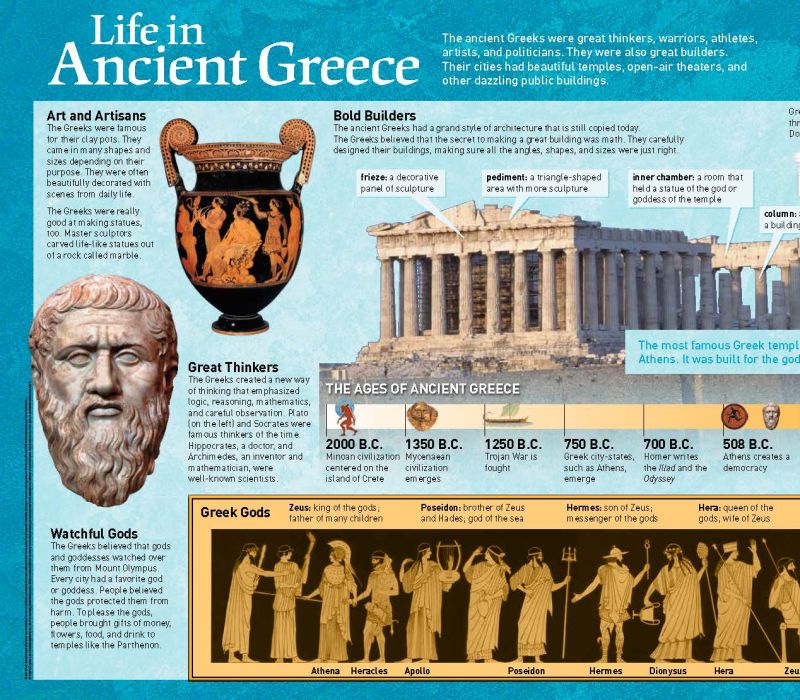Ancient Greece, a civilization that flourished from approximately the 8th century BCE to the 6th century CE, has captivated the imagination of historians, anthropologists, and the broader public alike. One aspect that often attracts attention is the longevity of its inhabitants. How long did people live in classical antiquity? The answer to this query not only illuminates the stark realities of ancient lives but also evokes deeper inquiries into the societal structures, cultural practices, and environmental factors that influenced life expectancy during this historical epoch.
The average lifespan in Ancient Greece has been a topic of considerable scholarly debate. Generally, evidence suggests that many individuals did not live past their thirties. Some estimates propose that the average life expectancy hovered around 35 years. However, these figures can be misleading if not contextualized properly. High infant and child mortality rates skew the averages dramatically. An infant born in ancient times faced a perilous existence, with roughly 30% succumbing in the first year. Those who managed to survive childhood often went on to live much longer, sometimes reaching their sixties or seventies.
To comprehend this phenomenon fully, it becomes essential to delve into the cultural relativism that governed Ancient Greek society. Cultural relativism posits that one should understand another culture based on its own merit and context, rather than applying contemporary standards. In this light, the perceived brevity of life among the Greeks invites an analysis of the social constructs and environmental conditions that shaped their existence. For instance, the lifestyle of ancient Greeks varied considerably between city-states like Athens and Sparta, impacting health and longevity.
In Athens, a prominent center for arts, philosophy, and democracy, economic prosperity and advancements in medicine contributed to a relatively healthier populace. Athenians had access to a variety of foods, predominantly Mediterranean in nature, which included grains, fruits, vegetables, olive oil, and fish. This diverse diet is thought to have positively affected health outcomes. Moreover, medical thinkers like Hippocrates began to emerge during this period, laying the groundwork for a more systematic understanding of health and disease. However, the lifestyle also came with its own challenges; political strife, war, and the limited understanding of hygiene often led to sporadic epidemics that could decimate populations.
Conversely, in Sparta, life was characterized by a rigorous martial regimen designed to foster strength and endurance. Though the Spartan upbringing led to robust physical prowess, the austere lifestyle left little room for the luxuries that might enhance longevity. The focus on communal living and the rigorous training of boys into warriors resulted in a culture that prized strength over health. While the Spartan society fostered formidable soldiers, it also propagated a high-risk environment where early death in battle was a statistical norm.
Investigating the agricultural practices of Ancient Greece also sheds light on health and lifespan. The agrarian economy entrenched in their culture dictated the daily lives of most citizens. Farmers employed ancient techniques that varied by region, often facing unpredictable weather patterns that could lead to famine. In a society where food security was an ongoing concern, malnutrition and starvation could significantly curtail life expectancy. This dependency on natural elements means that environmental factors intertwined with daily existence, revealing the broader complexities of survival in harsh conditions.
Moreover, social stratification played a crucial role in determining longevity. The elite class, enjoying relative affluence and access to nutrition and healthcare, often experienced longer lives than the working masses, who labored under demanding conditions and frequently fell prey to diseases linked to poverty. Wealth permitted a lifestyle with fewer health risks, while the impoverished populace faced a continual threat from malnutrition, poor living conditions, and lack of medical care. This disparity emphasizes the importance of viewing lifespans within the framework of social hierarchies.
Religion, too, had a bearing on how the Greeks perceived life and death. Ancient Greeks believed in a pantheon of gods who governed every aspect of existence, including health. Rituals and sacrifices were commonplace, based on the belief that divine favor could enhance one’s health or grant longevity. This propensity towards the spiritual realm invites a multifaceted dialogue on the interplay between religion and the human condition during antiquity. Such practices also offer insights into how ancient peoples rationalized their often harsh realities.
Through the lens of cultural relativism, exploring the factors that influenced longevity in Ancient Greece underscores the complexities inherent in human existence. It brings forth several questions regarding the relationships between environmental, social, and cultural dynamics. Why do we romanticize longevity when examining the past? Perhaps it is an instinctive desire to connect with our forebears, to understand their struggles, and to find solace in the shared experience of mortality. While the numbers may reflect a harsh reality, they also invite an appreciation for the resilience and adaptability of a civilization that has endured through history, leaving a profound impact that continues to inform modern thought.
In conclusion, the question of lifespan in Ancient Greece reveals far more than simple statistics. By examining the broader social context and cultural attitudes towards health and life, one uncovers the rich tapestry that comprises the human experience. The fascination with this ancient civilization lies not only in its achievements but also in the acknowledgment of the struggles that defined it. The insights gained from studying the lives of those who lived in Ancient Greece continue to resonate today, as we reflect on the nature of existence and the myriad factors that influence our own lives.
